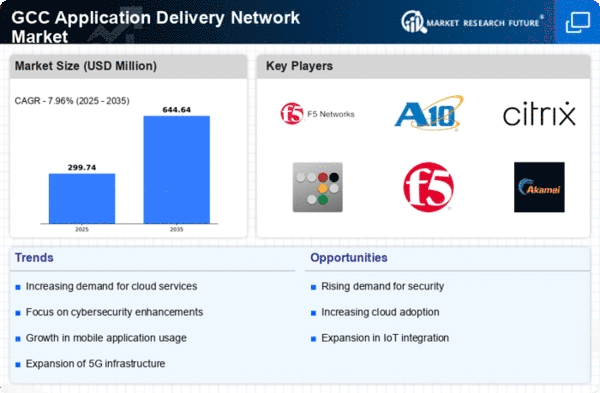Growth of E-commerce
The application delivery-network market is significantly influenced by the rapid growth of e-commerce in the GCC. With online retail sales projected to reach $25 billion by 2025, businesses are increasingly reliant on efficient application delivery networks to ensure seamless transactions and customer satisfaction. This growth necessitates the implementation of advanced delivery solutions that can handle high traffic volumes and provide fast response times. As e-commerce platforms expand, the demand for reliable and secure application delivery networks becomes paramount. Companies are investing in technologies that enhance performance, reduce latency, and improve overall user experience. This trend indicates a robust opportunity for the application delivery-network market, as organizations strive to meet the expectations of a digitally savvy consumer base.
Rising Internet Penetration
The application delivery-network market in the GCC is experiencing growth due to the rising internet penetration across the region. As of 2025, internet penetration in GCC countries has reached approximately 99%, facilitating increased online activities and digital services. This surge in connectivity drives demand for efficient application delivery solutions, as businesses seek to optimize user experiences. The application delivery-network market is thus positioned to benefit from this trend, as organizations require robust networks to handle the growing volume of data traffic. Enhanced internet access also encourages the adoption of cloud-based applications, further propelling the need for advanced application delivery solutions. Consequently, the market is likely to see a significant uptick in investments aimed at improving network performance and reliability.
Increased Mobile Device Usage
The proliferation of mobile devices in the GCC is a key driver for the application delivery-network market. As of 2025, mobile device penetration in the region is estimated to be around 90%, leading to a surge in mobile applications and services. This trend compels businesses to adopt application delivery solutions that cater specifically to mobile users, ensuring optimal performance and accessibility. The application delivery-network market must adapt to the unique challenges posed by mobile traffic, such as varying network conditions and device capabilities. Consequently, organizations are likely to invest in technologies that enhance mobile application performance, thereby driving growth in the application delivery-network market. This shift towards mobile-centric solutions reflects the changing landscape of consumer behavior and the increasing importance of mobile connectivity.
Focus on Digital Transformation
Digital transformation initiatives across various sectors in the GCC are significantly impacting the application delivery-network market. Organizations are increasingly adopting digital technologies to enhance operational efficiency and customer engagement. As businesses transition to digital platforms, the demand for reliable application delivery networks intensifies. The application delivery-network market is poised to benefit from this trend, as companies seek solutions that can support their digital strategies. Investments in application delivery technologies are expected to rise, with a focus on improving performance, security, and scalability. This shift towards digitalization indicates a growing recognition of the importance of robust application delivery networks in achieving business objectives and maintaining competitive advantage.
Regulatory Compliance Requirements
The application delivery-network market in the GCC is also shaped by stringent regulatory compliance requirements. As governments implement regulations to protect data privacy and security, businesses must ensure their application delivery networks comply with these standards. This compliance drives the need for advanced security features and monitoring capabilities within application delivery solutions. The application delivery-network market is likely to see increased demand for solutions that not only enhance performance but also adhere to regulatory frameworks. Organizations are investing in technologies that provide visibility and control over data flows, ensuring compliance with local laws. This focus on regulatory adherence presents both challenges and opportunities for the application delivery-network market, as companies navigate the complexities of compliance while striving to deliver optimal user experiences.
















